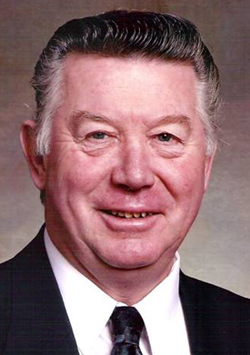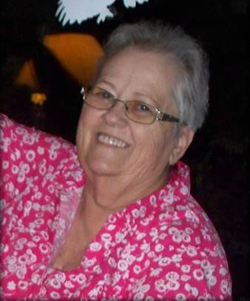2017 Ag Hall of Fame Inductees
All inductee write-ups were kindly written and provided by the Winchester Press
 Alvin Runnalls - 2017 Dundas County Agriculture Hall of Fame Inductee
Alvin Runnalls - 2017 Dundas County Agriculture Hall of Fame Inductee
Alvin Runnalls
A spirited force for both agriculture and the community
Alvin Runnalls’ sudden death, killed while felling trees on his property in January 2016, was shocking for so many in the community that St. Clare’s Anglican Church was at capacity during his funeral.
To say it was a sad end to a life well lived would be an understatement, but Runnalls’ untimely passing did serve as the lynchpin for the start of the Dundas County Agricultural Hall of Fame, an initiative he held a great passion for.
It’s fitting that he would be one of the hall’s first inductees.
Beyond that, his place in area agriculture is without compare.
Runnalls and his wife, Dawn, along with daughters, Rachel and Gretchen, first moved to Dundas County in 1973, establishing a dairy farm northeast of Winchester. With that, his four decades of services to various community organizations began.
While working an active farming operation, and dabbling in beekeeping and honey production, Runnalls also served, at various junctures, on the board of the Dundas Federation of Agriculture, was a director with the Ontario Federation of Agriculture, the Dundas Soil and Crop Improvement Association, served as a 4-H leader, helped the then Dundas County Food Bank and the Chesterville and District Historical Society, the Dundas County Players, Winchester District Memorial Hospital, the Upper Canada Playhouse and Canadian Club of Morrisburg and District, Heart and Stroke Foundation, St. Clare’s Anglican Church, the Dundas County Cattlemen’s Association, the Eastern Ontario Beekeepers Association, and the St. Lawrence River Institute.
In 1991, he and Dawn celebrated the sweet taste of accomplishment when they were named the recipients of the Eric Casselman Award, honouring the county’s farmer of year. Adding to the feat is the fact they were the first couple ever to be named co-recipients of an award distributed annually since 1966.
Among all of that, he also found time to vie for a seat in municipal politics, first elected as a councillor in the Township of North Dundas and then winning the mayor’s race in 2004. Re-election came his way in 2006, and the year previous he served as the 156th warden of the United Counties of Stormont, Dundas, and Glengarry (SD&G).
In 2010, with a challenge in the form of current township Mayor Eric Duncan, Runnalls again ran on his principles of reasonable taxes and the importance of being fair to municipal staff and ratepayers.
Duncan’s support base was an obstacle for the longtime mayor, however. Yet, Runnalls did not let his head hang low telling the Winchester Press at the time “it’s a load off my shoulders… My life’s full – always has [and] always will be. There’s no lack of things to do.”
It’s that generous spirit of giving that he’ll be forever known for. While in municipal politics, and aside from carrying a full load with the mayor’s title, Runnalls also served on the SD&G County Library board and helped the review committee for the Environmental Farm Plan.
In the early days, when his body still allowed, Runnalls was also a gifted marathon runner, wearing out the tread on countless pairs of shoes.
Runnalls’ nomination for the Dundas County Agricultural Hall of Fame was submitted by the Dundas Federation of Agriculture.
A spirited force for both agriculture and the community
Alvin Runnalls’ sudden death, killed while felling trees on his property in January 2016, was shocking for so many in the community that St. Clare’s Anglican Church was at capacity during his funeral.
To say it was a sad end to a life well lived would be an understatement, but Runnalls’ untimely passing did serve as the lynchpin for the start of the Dundas County Agricultural Hall of Fame, an initiative he held a great passion for.
It’s fitting that he would be one of the hall’s first inductees.
Beyond that, his place in area agriculture is without compare.
Runnalls and his wife, Dawn, along with daughters, Rachel and Gretchen, first moved to Dundas County in 1973, establishing a dairy farm northeast of Winchester. With that, his four decades of services to various community organizations began.
While working an active farming operation, and dabbling in beekeeping and honey production, Runnalls also served, at various junctures, on the board of the Dundas Federation of Agriculture, was a director with the Ontario Federation of Agriculture, the Dundas Soil and Crop Improvement Association, served as a 4-H leader, helped the then Dundas County Food Bank and the Chesterville and District Historical Society, the Dundas County Players, Winchester District Memorial Hospital, the Upper Canada Playhouse and Canadian Club of Morrisburg and District, Heart and Stroke Foundation, St. Clare’s Anglican Church, the Dundas County Cattlemen’s Association, the Eastern Ontario Beekeepers Association, and the St. Lawrence River Institute.
In 1991, he and Dawn celebrated the sweet taste of accomplishment when they were named the recipients of the Eric Casselman Award, honouring the county’s farmer of year. Adding to the feat is the fact they were the first couple ever to be named co-recipients of an award distributed annually since 1966.
Among all of that, he also found time to vie for a seat in municipal politics, first elected as a councillor in the Township of North Dundas and then winning the mayor’s race in 2004. Re-election came his way in 2006, and the year previous he served as the 156th warden of the United Counties of Stormont, Dundas, and Glengarry (SD&G).
In 2010, with a challenge in the form of current township Mayor Eric Duncan, Runnalls again ran on his principles of reasonable taxes and the importance of being fair to municipal staff and ratepayers.
Duncan’s support base was an obstacle for the longtime mayor, however. Yet, Runnalls did not let his head hang low telling the Winchester Press at the time “it’s a load off my shoulders… My life’s full – always has [and] always will be. There’s no lack of things to do.”
It’s that generous spirit of giving that he’ll be forever known for. While in municipal politics, and aside from carrying a full load with the mayor’s title, Runnalls also served on the SD&G County Library board and helped the review committee for the Environmental Farm Plan.
In the early days, when his body still allowed, Runnalls was also a gifted marathon runner, wearing out the tread on countless pairs of shoes.
Runnalls’ nomination for the Dundas County Agricultural Hall of Fame was submitted by the Dundas Federation of Agriculture.
 Gordon Johnson - 2017 Dundas County Agriculture Hall of Fame Inductee
Gordon Johnson - 2017 Dundas County Agriculture Hall of Fame Inductee
Gordon Johnson
Agri flame still burns
For Gordon Johnson, his dedication to agriculture in Eastern Ontario didn’t truly take off until he moved to Dundas County.
What started as a small hobby farm near Ashton, where he and his late wife and fellow Dundas County Agricultural Hall of Fame inductee, Marilyn, raised beef cattle, blossomed into much more when the couple uprooted and moved to the Chesterville area in 1973.
Originally a 30-cow setup, a new barn was built in 1975 to expand the operation to a 60-cow herd, with a tie-stall arrangement.
Today, the farm is run by Johnson’s son, Chris, and his wife Leslie along with their daughter Ashley and one hired hand. But, you can’t take the farm out of a farmer, and Johnson remains to feed the calves and keep all of the equipment in working order.
Beyond the on-farm success, Johnson has packed his resume with various organization memberships, including time with the Dundas Federation of Agriculture, the Dundas Farm Safety Organization, and the Dundas Soil and Crop Improvement Association. As well, from 1981 to 1994, he was a member of the Dundas Dairy Producer Committee, while also having held the positions of secretary/ treasurer, vice-chair, and chair.
He was a longtime member of the Chesterville and District Agricultural Society, serving as its president in 1987 and 1988, and this year he rejoined the collective.
Johnson’s involvement in agriculture also stretched beyond Dundas County, as he was the Dairy Farmers of Ontario (DFO) region two (Stormont, Dundas, and Ottawa-Carleton) board of directors’ representative from 1994 to 2006, and chair of the Eastern Ontario Milk Producers Committee, launching various promotional initiatives throughout the 10 counties in the region.
With DFO, Johnson was enlisted as a board member for the Agricultural Adaptation Council, serving a time as an executive member, and was board rep for the provincial Farm Safety Council, as well as the Human Resources Committee.
As for accolades, Johnson was the recipient of the Eastern Ontario Soil and Crop Award of Merit in 1989.
His service to the community wasn’t solely agricultural based, as Johnson had his hand in municipal politics, being elected to Winchester Township council in 1988. He served until 1994, and also sat on the Township of Winchester Recreation Committee and the Salary Committee.
It’s farming that remains near and dear to him, and his family says he’s not done yet. Johnson’s nomination for the Dundas Agricultural Hall of Fame was submitted by the Dundas Dairy Producers.
Agri flame still burns
For Gordon Johnson, his dedication to agriculture in Eastern Ontario didn’t truly take off until he moved to Dundas County.
What started as a small hobby farm near Ashton, where he and his late wife and fellow Dundas County Agricultural Hall of Fame inductee, Marilyn, raised beef cattle, blossomed into much more when the couple uprooted and moved to the Chesterville area in 1973.
Originally a 30-cow setup, a new barn was built in 1975 to expand the operation to a 60-cow herd, with a tie-stall arrangement.
Today, the farm is run by Johnson’s son, Chris, and his wife Leslie along with their daughter Ashley and one hired hand. But, you can’t take the farm out of a farmer, and Johnson remains to feed the calves and keep all of the equipment in working order.
Beyond the on-farm success, Johnson has packed his resume with various organization memberships, including time with the Dundas Federation of Agriculture, the Dundas Farm Safety Organization, and the Dundas Soil and Crop Improvement Association. As well, from 1981 to 1994, he was a member of the Dundas Dairy Producer Committee, while also having held the positions of secretary/ treasurer, vice-chair, and chair.
He was a longtime member of the Chesterville and District Agricultural Society, serving as its president in 1987 and 1988, and this year he rejoined the collective.
Johnson’s involvement in agriculture also stretched beyond Dundas County, as he was the Dairy Farmers of Ontario (DFO) region two (Stormont, Dundas, and Ottawa-Carleton) board of directors’ representative from 1994 to 2006, and chair of the Eastern Ontario Milk Producers Committee, launching various promotional initiatives throughout the 10 counties in the region.
With DFO, Johnson was enlisted as a board member for the Agricultural Adaptation Council, serving a time as an executive member, and was board rep for the provincial Farm Safety Council, as well as the Human Resources Committee.
As for accolades, Johnson was the recipient of the Eastern Ontario Soil and Crop Award of Merit in 1989.
His service to the community wasn’t solely agricultural based, as Johnson had his hand in municipal politics, being elected to Winchester Township council in 1988. He served until 1994, and also sat on the Township of Winchester Recreation Committee and the Salary Committee.
It’s farming that remains near and dear to him, and his family says he’s not done yet. Johnson’s nomination for the Dundas Agricultural Hall of Fame was submitted by the Dundas Dairy Producers.
 Marilyn Johnson - 2017 Dundas County Agriculture Hall of Fame Inductee
Marilyn Johnson - 2017 Dundas County Agriculture Hall of Fame Inductee
Marilyn Johnson
Leading the charge for women in agriculture
To Marilyn Johnson, “no” was a word so foreign that few in her family and circle of farming professionals heard her say it.
As her daughter Carol said, “Mom was always doing something.”
Johnson’s involvement with the Chesterville and District Agricultural Society, longtime organizers of the village’s fair, began in the mid-1970s and she remained busy behind the scenes until her death in 2015.
In that time, she served as a member, exhibitor, a committee participant, director, president of the ladies division, secretary of the homecraft division (in 1988), and society secretary.
“There were so many things that she did within the society that I would be afraid of missing something if I tried to list it all,” Carol said.
While Johnson resigned as the ag society’s secretary in 2009, she didn’t stop her involvement. Whenever other members had questions, she was just a phone call away. Johnson forever encouraged participation in the organization, and saw her final exhibits showcase and demolition derby just a few months before her death.
Beyond the society, Johnson was secretary/treasurer for the Dundas Federation of Agriculture for 15 years, and was one of the first area delegates to attend the Ontario Federation of Agriculture Convention.
She was a member of the grassroots Women for the Survival of Agriculture, which launched in 1975. Although started in Dundas County, the organization grew beyond the local borders to include neighbouring counties and serving to have women recognized by law as equal partners in the business of farming.
Through involvement in the local collective, Johnson joined the Ontario Farm Women Network and the Women and Rural Economic Development group, while also heading up Ag in the Classroom.
Ahead of all that, however, she and her husband, and fellow Dundas County Agricultural Hall of Fame inductee, Gordon, moved to the Chesterville area in 1973. To do so, they left behind a hobby beef farm they had acquired in 1965 near Ashton.
The couple, along with their children, Carol and Chris, helped grow the family farm with the addition of a tie-stall dairy barn and milking parlour, silos, and a liquid manure system.
“When she wasn’t fighting for equal rights, she was looking after the many behind- the-scenes activities of running a dairy farm,” Carol said.
Today, the farm continues under the watchful eye of her son, Chris, and his wife, Leslie, their daughter Ashley and one hired hand.
Outside of agriculture, Johnson served as secretary/ treasurer for Ye Olde Bargain Shoppe in Chesterville for nearly 20 years, and served as a leader with Girl Guides of Canada.
Johnson’s nomination for the Dundas County Agricultural Hall of Fame was submitted by the Chesterville Agricultural Society.
Leading the charge for women in agriculture
To Marilyn Johnson, “no” was a word so foreign that few in her family and circle of farming professionals heard her say it.
As her daughter Carol said, “Mom was always doing something.”
Johnson’s involvement with the Chesterville and District Agricultural Society, longtime organizers of the village’s fair, began in the mid-1970s and she remained busy behind the scenes until her death in 2015.
In that time, she served as a member, exhibitor, a committee participant, director, president of the ladies division, secretary of the homecraft division (in 1988), and society secretary.
“There were so many things that she did within the society that I would be afraid of missing something if I tried to list it all,” Carol said.
While Johnson resigned as the ag society’s secretary in 2009, she didn’t stop her involvement. Whenever other members had questions, she was just a phone call away. Johnson forever encouraged participation in the organization, and saw her final exhibits showcase and demolition derby just a few months before her death.
Beyond the society, Johnson was secretary/treasurer for the Dundas Federation of Agriculture for 15 years, and was one of the first area delegates to attend the Ontario Federation of Agriculture Convention.
She was a member of the grassroots Women for the Survival of Agriculture, which launched in 1975. Although started in Dundas County, the organization grew beyond the local borders to include neighbouring counties and serving to have women recognized by law as equal partners in the business of farming.
Through involvement in the local collective, Johnson joined the Ontario Farm Women Network and the Women and Rural Economic Development group, while also heading up Ag in the Classroom.
Ahead of all that, however, she and her husband, and fellow Dundas County Agricultural Hall of Fame inductee, Gordon, moved to the Chesterville area in 1973. To do so, they left behind a hobby beef farm they had acquired in 1965 near Ashton.
The couple, along with their children, Carol and Chris, helped grow the family farm with the addition of a tie-stall dairy barn and milking parlour, silos, and a liquid manure system.
“When she wasn’t fighting for equal rights, she was looking after the many behind- the-scenes activities of running a dairy farm,” Carol said.
Today, the farm continues under the watchful eye of her son, Chris, and his wife, Leslie, their daughter Ashley and one hired hand.
Outside of agriculture, Johnson served as secretary/ treasurer for Ye Olde Bargain Shoppe in Chesterville for nearly 20 years, and served as a leader with Girl Guides of Canada.
Johnson’s nomination for the Dundas County Agricultural Hall of Fame was submitted by the Chesterville Agricultural Society.
 Martin Schneckenburger - 2017 Dundas County Agriculture Hall of Fame Inductee
Martin Schneckenburger - 2017 Dundas County Agriculture Hall of Fame Inductee
Martin Schneckenburger
A life on the farm
Martin Schneckenburger has made quite a name for himself in the region’s agriculture field since immigrating to Canada.
It all started in 1956 when Schneckenburger and his wife, Evelyn, purchased farm property at the corner of County Road 28 and Smiths Road in the Glen Becker area.
Included were 160 acres of land, and a Jersey herd, which the couple developed into one of the top producing in Canada.
Schneckenburger was the recipient of the Canadian Jersey Cattle Club Certificate of Recognition, acknowledging the constructive effort to improve the breed through production testing, type classification, disease eradication and cooperation with other breeders, between 1962 and 1969.
In 1970, the herd was liquidated, but work didn’t stop. Schneckenburger and his family launched a beef feed lot, finishing 400 head annually, and purchased additional acreage to kick-start a cash crop enterprise.
Farm succession also became a topic of discussion, and Schneckenburger’s son, Arden, took on a more active role.
Before that, however, Schneckenburger earned multiple accolades.
In 1960, he received the Award of Merit from Hogg and Lyte Limited in recognition of winning first prize in the Dundas County Pasture Competition.
The Dundas Soil and Crop Improvement Association (DSCIA), an organization Schneckenburger had once served as president, named him Farmer of the Year in 1967. He was also a Dundas Federation of Agriculture member, serving 10 years as county director and representing the county at the Ontario Federation of Agriculture level.
Schneckenburger was a charter member of the Dundas County Cattlemen’s Association, and in 1977 was recognized by the group as an integral member who helped to improve the production of beef cattle in the county.
During the farm financial crisis of the 1970s, Schneckenburger served five years as chairman of the Ontario Family Farm Interest Reduction Review Appeal Board and the Farm Interest Assistance Program Appeal Board. At the same time, he was vice-chair of the Ontario Crop Insurance Board.
In 1979, the Eastern Ontario Soil and Crop Improvement Association presented Schneckenburger with the Award of Merit, and in 1984 he received the then Ontario Ministry of Agriculture and Food’s Bicentennial Certificate of Merit, which was followed up with the St. Lawrence Branch of the Ontario Institute of Agrologists Award of Merit in 1985.
The provincial arm of the Institute of Agrologists made Schneckenburger an honourary life member in 1996, and in 2014 the Ontario Soil and Crop Improvement Association presented him with a Lifetime Achievement Award.
As a tribute to forethought and planning, the farm Schneckenburger worked so hard to maintain continues to this day, operating as Cedar Lodge Farms, and overseen by his son, Arden, and grandson, Warren, and their families.
The enterprise today involves more than 3,000 acres for cash cropping, growing corn and soybeans. Schneckenburger has moved off the farm, nestling into a home in Morrisburg with his wife, but his interest in agriculture remains and he makes near daily trips back to where it all began to stay up-to-date.
Schneckenburger’s nomination for the Dundas County Agricultural Hall of Fame was submitted by Stan Vanden Bosch, as well as Gordon Garlough and Terry Daynard.
A life on the farm
Martin Schneckenburger has made quite a name for himself in the region’s agriculture field since immigrating to Canada.
It all started in 1956 when Schneckenburger and his wife, Evelyn, purchased farm property at the corner of County Road 28 and Smiths Road in the Glen Becker area.
Included were 160 acres of land, and a Jersey herd, which the couple developed into one of the top producing in Canada.
Schneckenburger was the recipient of the Canadian Jersey Cattle Club Certificate of Recognition, acknowledging the constructive effort to improve the breed through production testing, type classification, disease eradication and cooperation with other breeders, between 1962 and 1969.
In 1970, the herd was liquidated, but work didn’t stop. Schneckenburger and his family launched a beef feed lot, finishing 400 head annually, and purchased additional acreage to kick-start a cash crop enterprise.
Farm succession also became a topic of discussion, and Schneckenburger’s son, Arden, took on a more active role.
Before that, however, Schneckenburger earned multiple accolades.
In 1960, he received the Award of Merit from Hogg and Lyte Limited in recognition of winning first prize in the Dundas County Pasture Competition.
The Dundas Soil and Crop Improvement Association (DSCIA), an organization Schneckenburger had once served as president, named him Farmer of the Year in 1967. He was also a Dundas Federation of Agriculture member, serving 10 years as county director and representing the county at the Ontario Federation of Agriculture level.
Schneckenburger was a charter member of the Dundas County Cattlemen’s Association, and in 1977 was recognized by the group as an integral member who helped to improve the production of beef cattle in the county.
During the farm financial crisis of the 1970s, Schneckenburger served five years as chairman of the Ontario Family Farm Interest Reduction Review Appeal Board and the Farm Interest Assistance Program Appeal Board. At the same time, he was vice-chair of the Ontario Crop Insurance Board.
In 1979, the Eastern Ontario Soil and Crop Improvement Association presented Schneckenburger with the Award of Merit, and in 1984 he received the then Ontario Ministry of Agriculture and Food’s Bicentennial Certificate of Merit, which was followed up with the St. Lawrence Branch of the Ontario Institute of Agrologists Award of Merit in 1985.
The provincial arm of the Institute of Agrologists made Schneckenburger an honourary life member in 1996, and in 2014 the Ontario Soil and Crop Improvement Association presented him with a Lifetime Achievement Award.
As a tribute to forethought and planning, the farm Schneckenburger worked so hard to maintain continues to this day, operating as Cedar Lodge Farms, and overseen by his son, Arden, and grandson, Warren, and their families.
The enterprise today involves more than 3,000 acres for cash cropping, growing corn and soybeans. Schneckenburger has moved off the farm, nestling into a home in Morrisburg with his wife, but his interest in agriculture remains and he makes near daily trips back to where it all began to stay up-to-date.
Schneckenburger’s nomination for the Dundas County Agricultural Hall of Fame was submitted by Stan Vanden Bosch, as well as Gordon Garlough and Terry Daynard.
 Norm Tinkler - 2017 Dundas County Agriculture Hall of Fame Inductee
Norm Tinkler - 2017 Dundas County Agriculture Hall of Fame Inductee
Norm Tinkler
Going to war with water – and winning
Though he didn’t do it alone, Norm Tinkler was integral in leading the charge for all the farmers of Oak Valley long affected by spring flooding.
It’s a story as old as, well, time in the area, as Tinkler and his merry band went head to head with South Nation Conservation in an effort to redirect the river flow.
A successful dairy farmer near Winchester Springs, Tinkler’s involvement in the area’s watershed came from the need to protect his property from the continued flooding that was routinely problematic.
This was the late 1970s, and Tinkler and fellow farmers formed a “Save the Nation” committee focused on the protection of farmland, and proper drainage.
While the collective faced early opposition from the conservation authority, the group stuck to its need for a channelization project of the South Branch and South Nation rivers.
Ultimately, the work came to reality, with the conservation authority serving as an integral partner in the project.
Tinkler has long acknowledged that this involvement allowed his family to continue to operate a successful farming enterprise, and build a strong working relationship with South Nation Conservation.
From there, he served on the authority’s board as a municipal councillor representing the former Matilda Township for eight years. After leaving municipal politics, Tinkler has sat on the board of the Clean Water Committee since its formation in 1993, and served as a field representative for the program from 1999 to 2007.
Beyond that, Tinkler has been a director on the Dundas Soil and Crop Improvement Association for many years, including a term as president from 1990 to 1991. In 1989, the organization recognized him for his accomplishments by giving him the Farmer of the Year Award.
Tinkler was also the recipient of the Tri-Valley Conservation Award in 2010. He’s also served on the Matilda Recreation Committee, the Matilda Community Centre board, the county’s milk committee, South Dundas’ committee of adjustment, and was a township co-ordinator for the Ontario Federation of Agriculture.
All of this is on top of keeping tabs on the family’s dairy farm, and at one time managing a Pride Seeds dealership and doing custom work.
Tinkler’s nomination for the Dundas County Agriculture Hall of Fame was submitted by the Dundas Soil and Crop Improvement Association.
Going to war with water – and winning
Though he didn’t do it alone, Norm Tinkler was integral in leading the charge for all the farmers of Oak Valley long affected by spring flooding.
It’s a story as old as, well, time in the area, as Tinkler and his merry band went head to head with South Nation Conservation in an effort to redirect the river flow.
A successful dairy farmer near Winchester Springs, Tinkler’s involvement in the area’s watershed came from the need to protect his property from the continued flooding that was routinely problematic.
This was the late 1970s, and Tinkler and fellow farmers formed a “Save the Nation” committee focused on the protection of farmland, and proper drainage.
While the collective faced early opposition from the conservation authority, the group stuck to its need for a channelization project of the South Branch and South Nation rivers.
Ultimately, the work came to reality, with the conservation authority serving as an integral partner in the project.
Tinkler has long acknowledged that this involvement allowed his family to continue to operate a successful farming enterprise, and build a strong working relationship with South Nation Conservation.
From there, he served on the authority’s board as a municipal councillor representing the former Matilda Township for eight years. After leaving municipal politics, Tinkler has sat on the board of the Clean Water Committee since its formation in 1993, and served as a field representative for the program from 1999 to 2007.
Beyond that, Tinkler has been a director on the Dundas Soil and Crop Improvement Association for many years, including a term as president from 1990 to 1991. In 1989, the organization recognized him for his accomplishments by giving him the Farmer of the Year Award.
Tinkler was also the recipient of the Tri-Valley Conservation Award in 2010. He’s also served on the Matilda Recreation Committee, the Matilda Community Centre board, the county’s milk committee, South Dundas’ committee of adjustment, and was a township co-ordinator for the Ontario Federation of Agriculture.
All of this is on top of keeping tabs on the family’s dairy farm, and at one time managing a Pride Seeds dealership and doing custom work.
Tinkler’s nomination for the Dundas County Agriculture Hall of Fame was submitted by the Dundas Soil and Crop Improvement Association.

